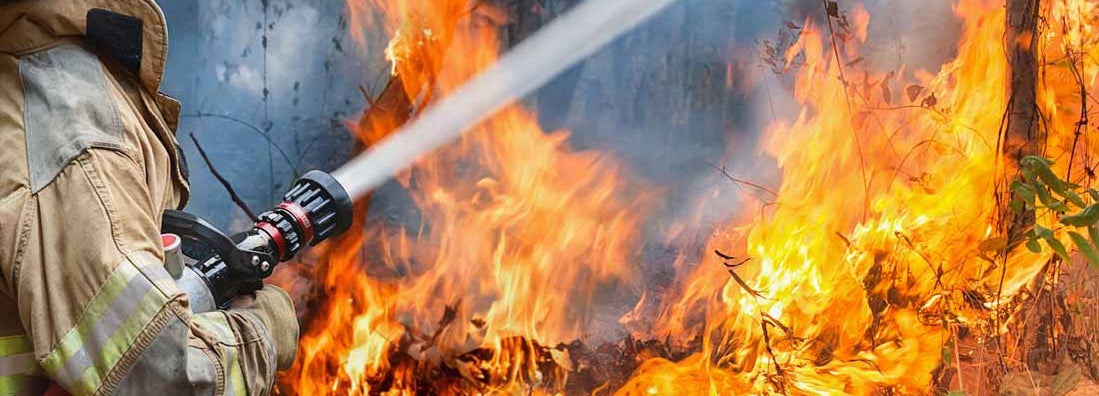Connecticut Fire Insurance
Find the right fire insurance policy for you.

Fires, whether intentionally set or not, can get out of control quickly. From fighting wildfires to arson, Connecticut's fire departments are no strangers to blazes. If you've just considered adding a fire insurance plan to your insurance protection portfolio or you are simply looking for quotes to upgrade, it's important to understand the basics of fire insurance in Connecticut. That way, you can decide on the right plan for yourself, your family and your property.
Most homeowners insurance policies cover fire and smoke damage; however, coverage amounts may vary. Homeowners policies also cover events such as windstorms, hail, lightning, theft or vandalism. They do not cover floods and earthquakes, but you can buy that coverage separately. Use our independent agent matching system to find the best insurance plan in your area. You tell us what you’re looking for, and our search engine will recommend the best agents for you. Any information you provide will be sent to only the agents you pick. We do not sell to third parties.
Connecticut Fire Facts
- Wildfires ravage about 2,000 acres per year in CT.
- There were 377 cases of arson in CT in 2012.
- 31% of those fires occurred in single-family dwellings.
- Total arson losses in 2012 totaled $6,573,265.
A fire can be devastating, whether it's arson or not, so it's important to have safety measures in place to protect yourself in case of fire:
- Always have smoke alarms installed in your home, along with an adequate number of fire extinguishers.
- Practice and display an escape plan.
- Keep your home free of fire hazards such as dead brush near the home, Christmas trees near the fireplace, matches within children's reach and flammable items next to the stove.
Do You Need Fire Insurance in Connecticut?
Your homeowners insurance most likely covers damage caused by fires. It is, however, important to be familiar with the coverage limits of your policies, as many have lowered covered perils and amounts for assets. Typically, the coverage amount on personal assets is half of the covered value of the home. For example, if your homeowners policy were to cover your house at a value of $300,000, your personal belongings limit would be $150,000.
Unfortunately, since a fire destroys everything in its path, this coverage may not be sufficient once you added up the value of your belongings.
How To Know if All Your Assets Are Covered
Your homeowners insurance has built-in fire insurance protection. However, it may not be enough. You also may be concerned about other items such as rental properties, businesses, cars, boats or other assets.
It's a wise idea to look at all of your insurance policies to make sure you have coverage for fire damage and to look for quotes if you do not. Liability insurance does not cover fire, smoke or wind damage. Liability insurance only covers an injured third party, or third-party property damage. For items like cars, boats, RVs and trailers, you will need to have comprehensive insurance in order to have protection against fire damage. Landlord insurance may also have fire insurance built-in. However, it typically will not provide coverage for tenants' personal belongings. A renters policy would cover personal belongings.
What Does Fire Insurance Cover?
Fire insurance covers damage to your home and personal belongings due to fire caused by persons or events. This can be either owner-caused (Such as an electrical or grease fire) by someone else, or by wildfire. These insurance policies are available in two forms of reimbursement:
- Actual cash value (ACV): Where your item is valued at its actual worth, taking depreciation into account.
- Replacement cash value (RCV): Where your item is valued at what it would cost for a comparable item at current prices.
While it may seem more cost-advantageous to purchase an ACV plan, you may want to review quotes for RCV plans as well, lest you would be satisfied with reimbursement for much less than it would cost to replace damaged items.
And fire insurance does not cover vehicles, boats or ATVs in most circumstances. In order to cover these items, you must carry comprehensive coverage on them or cover them under an umbrella policy. There are also policies available to protect businesses, as well as renters' personal belongings.
How To Obtain Fire Insurance in Connecticut
While you may have homeowners insurance to protect your home, you may still have questions regarding coverage or limits. Whether you're looking for a brand new policy or just trying to get clarification on an existing one, a Trusted Choice® agent is always available to help answer questions and get you and your belongings fully protected from whatever life throws your way.
Let a Trusted Choice agent help you. Talk with a friendly, local independent agent for more information.
